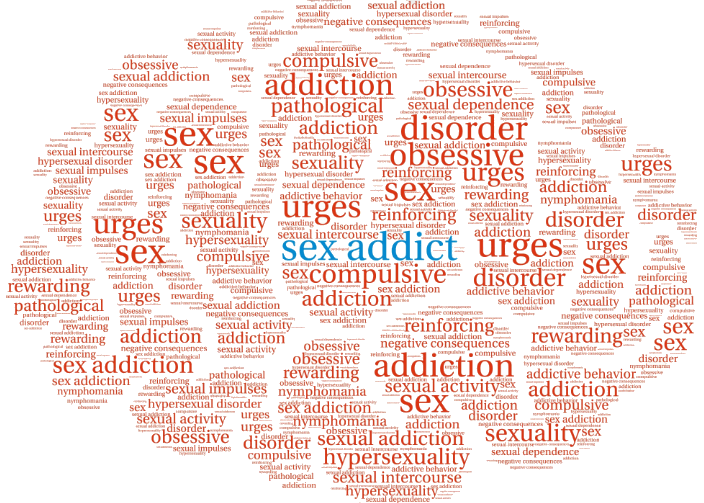COMPULSIVE SEXUAL
BEHAVIOR DISORDER
Compulsive Sexual Disorder Behavior (CSBD) is a persistent and escalating pattern or patterns of sexual behaviors acted out despite increasingly negative consequences to self or others.
CSBD is often referred to Sex Addiction, Hypersexuality Disorder or Out Of Control Sexual Behavior, however all signal the same repetitive behaviors that may reflect CSBD such as those below.
WHAT ISCOMPULSIVE SEXUAL BEHAVIOR DISORDER?
The World Health Organization recently added Compulsive Sexual Behavior Disorder (CSBD) to its International Classification of Diseases.
Dr. Patrick Carnes, founder of the International Institute for Trauma and Addiction Professionals (IITAP) has defined the criteria for CSBD as follows:
- Recurrent failure to resist sexual impulses in order to engage in specific sexual behaviors
- Frequently engaging in those behaviors to a greater extent or over a longer period of time than intended
- Persistent desire or unsuccessful efforts to stop, reduce, or control those behaviors
- Inordinate amounts of time spent in obtaining sex, being sexual, or recovering from sexual experiences
- Preoccupation with sexual behavior or preparatory activities
- Frequent engaging in the behavior when expected to fulfill occupational, academic, domestic, or social obligations
- Continuation of the behavior despite knowledge of having a persistent or recurrent social, financial, psychological, or physical problem that is caused or exacerbated by the behavior
- The need to increase the intensity, frequency, number, or risk level of behaviors in order to achieve the desired effect; or diminished effect with continued behaviors at the same level of intensity, frequency, number, or risk
- Giving up or limiting social, occupational, or recreational activities because of the behavior
- Distress, anxiety, restlessness, or irritability if unable to engage in the behavior
In addition, there are 20 collateral indicators which assist in the assessment of CSBD. A minimum of six criteria must be met:
- Has severe consequences because of sexual behavior
- Meets the criteria for depression and it appears related to sexually acting out
- Meets the criteria for depression and it appears related to sexual aversion
- Reports history of sexual abuse
- Reports history of physical abuse
- Reports history of emotional abuse
- Describes sexual life in self-medicating terms (intoxicating, tension relief, pain reliever, sleep aid)
- Reports persistent pursuit of high-risk or self-destructive behavior
- Reports sexual arousal to high-risk or self-destructive behavior is extremely high compared to safe sexual behavior
- Meets diagnostic criteria for other addictive disorders
- Simultaneously uses sexual behavior in concert with other addictions (gambling, eating disorders, substance abuse, alcohol-ism, compulsive spending) to the extent that the desired effect is not achieved without sexual activity and/or other addiction(s) pre-sent
- Has history of deception around sexual behavior
- Reports other members of the family are addicts
- Expresses extreme self-loathing because of sexual behavior
- Has intimate relationships that are not sexual
- Is in crisis because of sexual matters
- Has history of crisis around sexual behavior
- Experiences diminished pleasure for same sexual experiences
- Comes form a “rigid” family
- Comes from a “disengaged” family

COMPULSIVE SEXUAL
BEHAVIOR DISORDER
- Compulsive masturbation
- Simultaneous affairs
- Repeated sequential affairs
- Pornography
- Cyber-sex, phone sex, sexting
- Massage parlors
- Multiple anonymous partners
- Unsafe sexual activity
- Partner sexualization
- Partner objectification
- Strip clubs and adult bookstores
- Sexual aversion
- Prostitution
PATHOS
Like any disorder, we as therapists use a set of criteria to determine if there is indeed an issue that needs to be addressed. Below is a simple set of questions called PATHOS that helps you determine whether you should take the next step in seeking professional help:
Preoccupied
Do you often find yourself preoccupied with sexual thoughts?
Ashamed
Do you hide some of your sexual behavior from others?
Treatment
Have you ever sought therapy for sexual behavior you did not like?
Hurt others
Has anyone been hurt emotionally because of your sexual behavior?
Out of control
Do you feel controlled by your sexual desire?
Sad
When you have sex, do you feel depressed afterwards?

